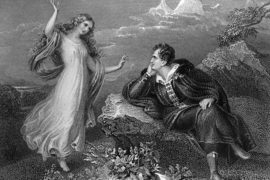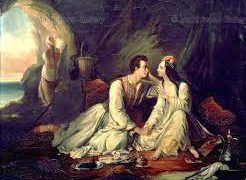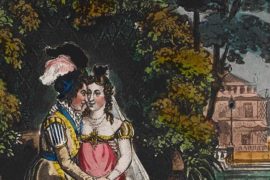Her favourite science was the mathematical,
Her noblest virtue was her magnanimity,
Her wit (she sometimes tried at wit) was Attic all,
Her serious sayings darken’d to sublimity;
In short, in all things she was fairly what I call
A prodigy—her morning dress was dimity,
Her evening silk, or, in the summer, muslin,
And other stuffs, with which I won’t stay puzzling.
She knew the Latin—that is, ‘the Lord’s prayer,’
And Greek—the alphabet—I ‘m nearly sure;
She read some French romances here and there,
Although her mode of speaking was not pure;
For native Spanish she had no great care,
At least her conversation was obscure;
Her thoughts were theorems, her words a problem,
As if she deem’d that mystery would ennoble ’em.
She liked the English and the Hebrew tongue,
And said there was analogy between ’em;
She proved it somehow out of sacred song,
But I must leave the proofs to those who ‘ve seen ’em;
But this I heard her say, and can’t be wrong
And all may think which way their judgments lean ’em,
‘‘T is strange—the Hebrew noun which means “I am,”
The English always use to govern d–n.’
Some women use their tongues—she look’d a lecture,
Each eye a sermon, and her brow a homily,
An all-in-all sufficient self-director,
Like the lamented late Sir Samuel Romilly,
The Law’s expounder, and the State’s corrector,
Whose suicide was almost an anomaly—
One sad example more, that ‘All is vanity’
(The jury brought their verdict in ‘Insanity’).
In short, she was a walking calculation,
Miss Edgeworth’s novels stepping from their covers,
Or Mrs. Trimmer’s books on education,
Or ‘Coelebs’ Wife’ set out in quest of lovers,
Morality’s prim personification,
In which not Envy’s self a flaw discovers;
To others’ share let ‘female errors fall,’
For she had not even one—the worst of all.
O! she was perfect past all parallel—
Of any modern female saint’s comparison;
So far above the cunning powers of hell,
Her guardian angel had given up his garrison;
Even her minutest motions went as well
As those of the best time-piece made by Harrison:
In virtues nothing earthly could surpass her,
Save thine ‘incomparable oil,’ Macassar!
Perfect she was, but as perfection is
Insipid in this naughty world of ours,
Where our first parents never learn’d to kiss
Till they were exiled from their earlier bowers,
Where all was peace, and innocence, and bliss
(I wonder how they got through the twelve hours),
Don Jose, like a lineal son of Eve,
Went plucking various fruit without her leave.
He was a mortal of the careless kind,
With no great love for learning, or the learn’d,
Who chose to go where’er he had a mind,
And never dream’d his lady was concern’d;
The world, as usual, wickedly inclined
To see a kingdom or a house o’erturn’d,
Whisper’d he had a mistress, some said two—
But for domestic quarrels one will do.
Now Donna Inez had, with all her merit,
A great opinion of her own good qualities;
Neglect, indeed, requires a saint to bear it,
And such, indeed, she was in her moralities;
But then she had a devil of a spirit,
And sometimes mix’d up fancies with realities,
And let few opportunities escape
Of getting her liege lord into a scrape.
This was an easy matter with a man
Oft in the wrong, and never on his guard;
And even the wisest, do the best they can,
Have moments, hours, and days, so unprepared,
That you might ‘brain them with their lady’s fan;’
And sometimes ladies hit exceeding hard,
And fans turn into falchions in fair hands,
And why and wherefore no one understands.
Featured Image via Britannica
Read Canto 1, Stanzas 21-30 here.







1 Comment
Pingback: Don Juan: Canto 1, Stanzas 1-10 - Untwine Me